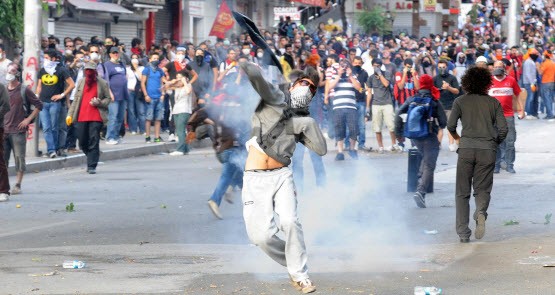
On Saturday, Turkish police violently cracked down on protesters trying to stymie development of Gezi Park, reportedly one of the last green places in central Istanbul. Police beat the protesters and attacked then with tear gas, and according to most monitors the brutality resulted in two deaths. Some protesters have reportedly permanently lost their eyesight, due to being gassed at close range. Over 900 protesters were arrested. The vast majority, if not all, have since been released , and report being been beaten while in jail.
The protests have earned Turkey condemnation from the international community, including from America. However, Saturday’s events are only the latest in a score of violent police crackdowns on peaceful protests, according to Amnesty International’s Turkish director, Murat Cekic.
“During the last three months, we’ve had five incidences of this type of police violence in Turkey,” he told Crikey from Amnesty International’s Istanbul office near Taksim Square, where protesters are being treated for injuries.
On April 8, citizens marched in the streets to protest against the demolition of Turkey’s iconic Emek Theatre, which is set to make way for a new entertainment and shopping complex. The protesters were joined by many international visitors, who were in the city for the Istanbul film festival. Even this, however, did not ensure their safety.
“They were beaten up, and there was excessive and dangerous use of tear gas,” Cekic said. Tear gas in small doses produces a burning sensation in the eyes, but excessive exposure can lead to temporary or lasting blindness, or in extreme cases, where the throat is so inflamed to cut off breathing, death.
Cekic describes another incident on May 1, when protesters wanted to gather for a May Day celebration at the central Taksim Square, as they have for several years. They were also met with “shameful” and “excessive” police violence, along with “unbelievable amounts of tear gas”. “I can say that the Turkish government has a habit of this, to use excessive police violence against peaceful protesters,” he said.
On Sunday, there were 50,000 protesters still in Taksim Square and the streets around it. “The reaction that the government gave, it triggered a wider opposition,” Cekic said. He says he fears for their safety, although on Sunday, monitors reported to him the square was peaceful. Police crackdowns have been escalating, he says, because of a culture of impunity towards such actions.
“Very unfortunately, it’s been a tradition in Turkey that people who are responsible, government officials or police, have not been effectively persecuted or bought to a fair trial. We can’t speculate about what’s going to happen afterwards. But Turkey has a bad record on this,” Cekic said.
*Myriam Robin is in Istanbul as a guest of Dell, which has paid for her flights and accommodation








isn’t it ironic that turkey is mimicking the behaviour they’re fomenting war with syria’s regime over. “we’re just doing what every other nation would do”.
reeaaalllly
Turks will not thanks lazy journos. (& idiotic US Sec of State Kerrey)for referring to the disturbance as that coubntry’s “ARAB” Spring. Apart from not being ethinc arab, they are regarded as peasants having been ruled by Turks for centuries.